#the midnight swim
Text

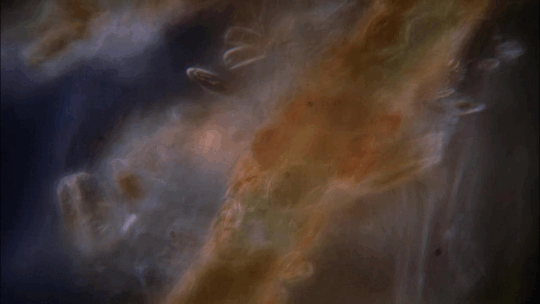



Sarah Adina Smith, {2014} The Midnight Swim
#film#gif#sarah adina smith#the midnight swim#2014#female filmmakers#interiors#wind#screens on screen#colour#microscope#2010s#feature length#usa
62 notes
·
View notes
Text

#qijiu#original shen qingqiu#shen jiu#yue qingyuan#fanart#merman#this happens aftfer they sort through that big misunderstanding they have#had*#:33#good for them#also would it not be cool if sqq runs this#business thing. like how women used to sell poison to wives to get rid of their husbands?#that sort of thing#but instead he lures the men into the waters#for a midnight swim :) definitely just a swim and not a whole lot of asphyxiation or smth#yqy makes sure sqq and the women dont get caught#women also includes the wrp ladies#svsss#mxtx
656 notes
·
View notes
Text
No words appear before me in the aftermath
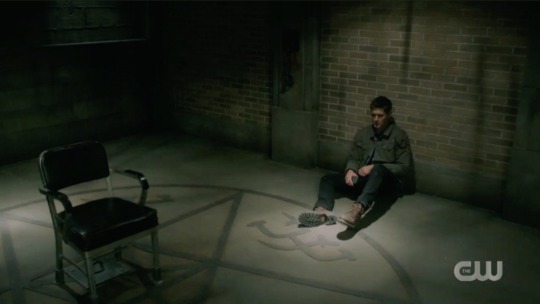
Salt streams out my eyes and into my ears

Every single thing I touch becomes sick with sadness

'Cause it's all over now, all out to sea

Goodbye, goodbye, goodbye
You were bigger than the whole sky

You were more than just a short time

And I've got a lot to pine about

I've got a lot to live without

I'm never gonna meet

What could've been, would've been

What should've been you
*
Did some bird flap its wings over in Asia?
Did some force take you because I didn't pray?
Every single thing to come has turned into ashes
'Cause it's all over, it's not meant to be
So I'll say words I don't believe
*
#swiftnatural#destiel#spn#taylor swift lyrics#bigger than the whole sky#deancas#dean winchester#castiel#dean and cas#dean x castiel#cas#don't mind me#just me swimming in a pool of feels right now#supernatural#taylor swift#midnights lyrics#spn destiel#spn despair
182 notes
·
View notes
Text

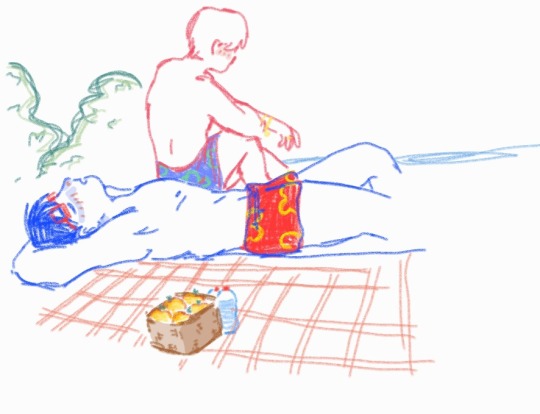
summer is over
#I LIED THE LAST TIME I SAID I'LL PROB NEVER POST FANART AGAIN#cropping or screenshotting makes the resolution go shit but i don't have another choice#(i think)#SUMMER ENDED AND I NEEDED TO VIKTUURI ON A SUMMER VACATION#so here's another thumb piece#i can't stop giving viktor those gold bracelets THEY'VE BEEN HAUNTING ME SINCE THE MOMENT I SAW THAT OFFICIAL ART#he needs them#i need to see him wearing them#yeah yuuri is looking at his lovely and pretty husband <3#aaand post swimming victuuri#real ones know that post swimming nap hits different 💯💯#don't worry guys they have nectarins and water#all the essential things to survive#anyway ate one today it was DELICIOUS#ok i'm done#BYEEE#yuri on ice#fanart#victuuri#my brain is not working at midnight i swear#*i needed to draw viktuuri
128 notes
·
View notes
Text
Daydream Generation: The Lasting Legacy of Akira Toriyama's Work
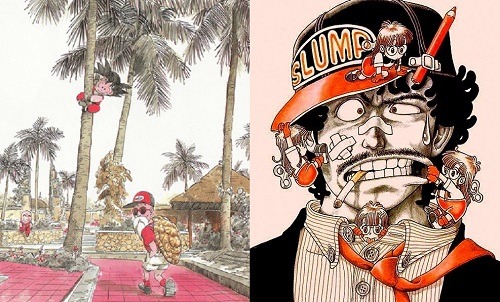
Here on AcquiredStardust we don't talk about anime enough and we wish that beginning to rectify this could've come under better circumstances. Just what is the Daydream Generation anyway? Join Ash as she attempts the impossible task of summarizing the importance of the 'god of manga' Akira Toriyama after his passing earlier this month in this special tribute.
Late Thursday night news finally broke on social media that beloved manga author Akira Toriyama had passed away several days before, prompting an immediate outpouring of grief the world over. Many of us feel a deep sense of loss in a way unimaginable before his work achieved the level of cultural penetration and ubiquitous veneration that it has, and it is impossible to overstate the singular importance he had in shaping our modern culture.
Responsible for hit manga Dr. Slump and Dragon Ball which quickly found themselves at the forefront of the Japanese pop culture renaissance of the Showa period, Toriyama's work is possessed of a rare combination of an earnest childlike wonder and adventure that is perfectly serviced by an instantly recognizable art style that is something of a rite of passage to for budding artists to imitate. It is in that Showa boom period that the Daydream Generation, a term coined by Toriyama disciple Yoshihiro Togashi's Yu Yu Hakusho particularly as the title of its 5th ending theme, is forged.
It is no overstatement to refer to Akira Toriyama as "the god of manga", and in fact he is referred to as such by Masashi Kishimoto of Naruto fame. It is Kishimoto's generation, coming of age in the Showa era in which Toriyama produces his most significant works, that finds themselves first so captivated by it. Although anime is in the middle of a golden age by the time Toriyama's work is published (lead perhaps most by Leiji Matsumoto of Galaxy Express 999/Captain Harlock fame and Mobile Suit Gundam visionary Yoshiyuki Tomino), Toriyama's work forges a connection with Japanese readers in a way that other work hasn't quite in the same way.
Perhaps it is the clean linework, deceptively simplistic and stylish all at once. Perhaps it is the expressive characters often named with clever puns or food related names. Perhaps it is familiar cultural touchstones and elements of comedy and parody rolled seamlessly into each other. Perhaps it is the refinement in elements popularized by contemporary works like Ring ni Kakero such as the frequent use of tournaments as a framing for the plot Perhaps it is the rare ability for Toriyama to create characters that often appeal equally to male and female readers without either demographic rejecting them, feat only rivaled with any real frequency by authors Rumiko Takahashi and Hiromu Arakawa.
Regardless of the cause, the strong creative voice and earnestness that shines through Dr. Slump and Dragon Ball does something special for children of the Daydream Generation: it makes the job of creating manga seem more attainable than other works of the time do. It gives a generation of children the ability to dream, some for the first time, of their own works. It is in the immediate wake of these works that authors such as Masashi Kishimoto, Yoshihiro Togashi, Tite Kubo and Eiichiro Oda come of age and dream of their own works in direct inspiration from them.
The Daydream Generation, sat in their desks at class fantasizing about a world in which they too would be able to pursue creative dreams in a postwar Japan perhaps otherwise unattainable to them without first being armed with the sense of accessibility that Toriyama provided readers, affectionately refer to Toriyama as 'sensei' nearly universally. It is he who is the god of manga, revered and emulated - Toriyama, more so than any individual, is responsible for the explosion of Japanese pop culture in this era and many manga authors are frank in their admittance of such. It isn't just limited to the world of manga either, as Toriyama has a hand in multiple iconic video games such as Enix's Dragon Quest and Square's Chrono Trigger.
But then something equal parts special and unlikely happens: in the late 1990s Toriyama's work begins to be exported into the west with relatively minimal changes to the source material, and the whole process repeats itself. This time with a constant flow of follow up works by the Daydream Generation to help Japan's global pop culture takeover.
Anime's infiltration into the west played out on college campuses, and in those early days of fandom defined by import VHS and LaserDisc it was nearly unthinkable that it would end up mainstream enough to appear on television. While early ground is gained on anime in the mainstream (particularly Ronin Warriors hitting television in a largely unedited form in 1995 as well as multiple attempts to import Sailor Moon around the same timeframe, not to mention Pokemon's debut in late 1998), it is not until the revamping of Cartoon Network's Toonami block, spearheaded by Dragon Ball Z, that anime would truly arrive in the west.
The importance of Toonami in getting anime in front of the eyes of the generation following the Daydream Generation in America cannot be overstated. It was the first time many of us laid eyes on animation that wasn't an episodic comedy, with more mature themes. It was the first time we had encountered drastic cultural differences inherent in anime. For many of us, particularly in the case of Dragon Ball Z, it was even the first time we began to see animation and even creativity as being something that comes from someone rather than spontaneously generating itself for consumption. For the first time in my memory a mania kicked off with the addition of Dragon Ball Z to Toonami in 1999 that changed the way my generation thought about and consumed media.
Gathered around our own desks ten plus years later, American children male and female alike passionately discussed Dragon Ball Z. We debated power levels, questioned what other planets and races populated the universe of the series, and for the first time we discussed concepts that were unknown to us just a short time before: who was the creator of this series and where did it come from? Mirroring the effect that Toriyama's work had on the Daydream Generation many Milennials and Gen X people, especially those with no prior introduction to anime, found themselves absolutely captivated by Dragon Ball Z. Millions of young people put pencil to paper for the first time to imitate the art style of Toriyama brought to animated glory by the staff at Toei or to write fanfiction. We developed these skills and collaborated with each other now armed with the same sense of approachability that the Daydream Generation had years before us. And then the hits kept coming.
Serving as a gateway into a world of animation previously largely unknown in the west, Toonami exploded in the following years.
Starting in 2000 Toonami added Tenchi Muyou, a series almost completely different to Dragon Ball Z which would go on to be an influence in Dana Terrace's recent Disney hit The Owl House, and Mobile Suit Gundam Wing. The Gundam franchise, originally popular in Japan contemporaneously with Akira Toriyama's work, had seen many followups and spinoffs in the years after the original series ended and had itself become a titan of Japanese pop culture. Finally hitting the west using Dragon Ball Z as a bridge, it was the first time many of us were introduced to animation as a medium for communicating complicated political ideas.
Perhaps most significantly, as is easily observed through diving into the wealth of old abandoned websites from the Geocities era, Gundam Wing served as a vehicle through which young people were introduced to male characters that all seemed to have romantic chemistry with each other. Having both lived through the era and examining it in retrospect I say with all sincerity that it was Gundam Wing that helped begin the yaoi craze in the west, by then a well established thing in Japan, and was therefore absolutely instrumental in beginning to soften the attitudes of young people towards queer people in the west.
A strong hunger for more of this extremely different kind of animation had been created and the floodgates were about to open. Years immediately following saw the broadcast of memorable anime such as Outlaw Star and The Big O. 2003 saw Nobuhiro Watsuki's unavoidably Japanese historical fiction piece Rurouni Kenshin debut in America, Yoshihiro Togashi's Yu Yu Hakusho finally make the transition to the west followed by Eiichiro Oda's One Piece and Masashi Kishimoto's Naruto in 2005. Each of these works massively impacted my generation and empowered us in a different way: whereas the Daydream Generation saw the opportunity to create their own works my generation had the luxury of exploring these works, full of ideas and states of being unknown to us before then. We were armed with the ability not just to create our own works but to create ourselves and to decide who we would be far more liberally than we would have otherwise been comfortable doing in the past.
It is worth noting that Toonami did not have total dominion over the boom of anime in America: while there were others in later years, latenight programming [Adult Swim] pursued an older viewer who was hungry for even more of what the wide world of anime had to offer. Rumiko Takahashi's Inuyasha was an early favorite alongside the likes of such classics as Cowboy Bebop, Trigun and FLCL. Already massively influential in his own right, it was using Akira Toriyama's work as a foothold that quite literally proved to be the breakthrough moment for anime in the west and provide any of these incredible shows with an audience here.
As such there are few people you can point to as singularly responsible for shaping the way our culture (and that's culture at large - not just pop culture) works. Akira Toriyama's name is up there with the likes of Walt Disney and George Lucas in its weight. His works and the bridge they provided to other works helped to reshape the way we communicated with each other, the ways in which we saw ourselves, and the things we dared to dream. Millions and millions of people pursued writing or drawing, or the powerful physiques of Akira Toriyama's characters featured in Dragon Ball, and those who were inspired by him continue to share his work with their offspring ensuring his timeless classics remain in circulation perpetually.
He is, while not the origin point, the biggest guiding hand in so many aspects of our culture and the man most singularly responsible for the exporting of Japanese pop culture to the world. He has left behind an incredible legacy that few could ever hope to achieve and fewer yet will, and more importantly he inspired generations of people to be and do things they otherwise never would've thought possible. Both directly and indirectly his fingerprints are all over what you enjoy perhaps without even realizing it, and it's unlikely that will ever go away no matter how far we get from his life and work.
#acquired stardust#anime#manga#akira toriyama#dr slump#dragon ball#dragon ball z#dragonball#dragonball z#toonami#anime spotlights#adult swim#midnight run#toei#toei animation#bird studio#ThankYouToriyama#thank you toriyama#ash
29 notes
·
View notes
Text
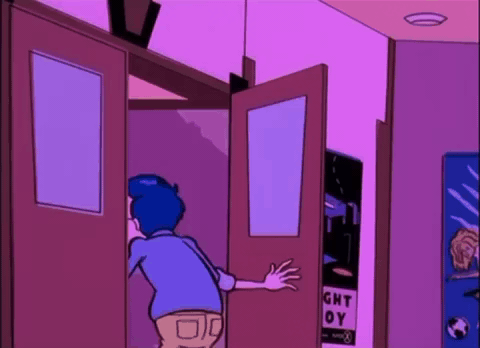
Mission Hill, ep 13
#mission hill#90s#2000s#y2k#animation#cartoon#cartoon network#adult swim#tv#the wb#wb#warner brothers#warner bros#midnight cowboy#00s
59 notes
·
View notes
Text
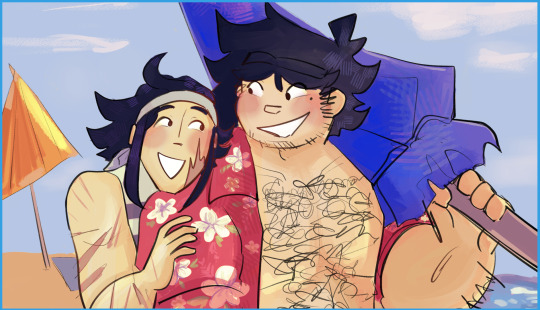
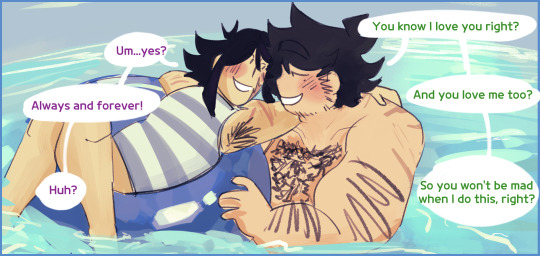
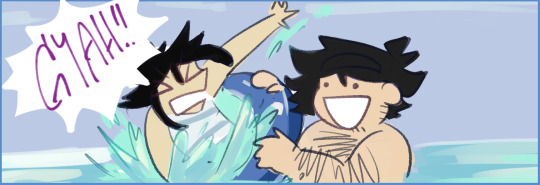
these guys always make me think of seasons way too far in advance . anyway summertime with these goofers
ok2rb he/him for both etc etc i love you all
#📗; my post#💚; art tag#r; 🔥#mcsm#mcsm axel#minecraft story mode#mcsm oc#selfshipping#rule numero uno you cant trust a griefer to not flip your tube over when youre swimming#scheduled for the morning because i keep cranking these out when its midnight & nobodies awake#🗺; ellis
21 notes
·
View notes
Text

A quick Inuyasha and Kagome for my spawnling
#inuyahsa#kagome#traditional art#fan art#hand drawn#mixed media#anime#toonami#midnight run#adult swim#artists on tumblr
28 notes
·
View notes
Text

Some drawings for funni plant day 🍃💨
16 notes
·
View notes
Text
No one talks about the Golden Trio era Gryffindor boys being normal dumbass teenage boys. You’re telling me that Dean, Seamus, Neville, Ron and Harry never did any dumb shit together? They literally shared a room for seven years, of course they did dumb shit!!
#They snuck out to go midnight swimming in the lake#They pushed eachother in shopping carts down hills#They snuck fire whiskey into the dorm#They went flying at night#They had bad inside jokes#And chess tornaments#Just being dumbasses#the golden trio#harry potter#ron Weasley#neville longbottom#seamus finnigan#dean thomas
125 notes
·
View notes
Text

"So scarlet it was, maroon."
Maroon | Taylor Swift
86 notes
·
View notes
Photo

Summer Musings 2023
iPhoneXR Hipstamatic Photography
Original Photographers
Photographers On Tumblr
Lowy Lens, Midnight Sun AS Film, No Flash
#hipstamatic#original photographers#photographers on tumblr#beach ball#night time swim#pool#summer#art#capiolumen#iphone#iphoneXR#iphotography#lowy lens#midnight sun as film#no flash
27 notes
·
View notes
Text
I think this book is gonna give me a mental breakdown.
#carol reads#the midnight library#i too have life fright. i relate to the main character...from the fear of decisions to the swimming competition stuff
7 notes
·
View notes
Text
my hired sorcerer pawn floated herself off a cliff and directly into the brine and died before I could save her (not my fault) and the immediate next dialogue from my other pawns was 'I believe this party could benefit from the addition of a sorcerer' LIKE I'M TRYING!!!!!!!!!!!!!!!!!!!
#saint plays DD2#IT WASN'T MY FAULT SHE DECIDED TO GO FOR A MIDNIGHT SWIM OK. JUST CAN IT UNTIL WE'RE BACK IN VERNWORTH SFBVHBVSF
3 notes
·
View notes
Text

#the amazing digital circus#adult swim#xavier renegade angel#moral orel#the midnight gospel#off the air#problem solverz
8 notes
·
View notes
Text
Artist Interview: “The Last Song I’ll Write About You” by Midnight Swim
I love these guys! They are awesome musicians and know they're going places! Rock out with me to "The last Song Write About You" 🙌🔥🥰
#blog#indie#music#journalist#news#coffee#florida#good morning#rock music#indie rock#indie music#concert#Midnight Swim#Midnight Swim band#The Last Song I'll Write About You#divorce#emerging artists#rising artists#musicians#unsigned artists#band#independentartists#indie musicians#Spotify
2 notes
·
View notes